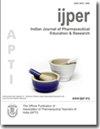生物转化人参皂苷对苯肼致血液毒性的抑制作用
IF 0.8
4区 医学
Q3 EDUCATION, SCIENTIFIC DISCIPLINES
Indian Journal of Pharmaceutical Education and Research
Pub Date : 2023-10-04
DOI:10.5530/ijper.57.4.136
引用次数: 0
摘要
摘要:目的:探讨生物转化人参皂苷对苯肼(PHZ)诱导的肝毒性和贫血的抑制作用。材料和方法:我们在苯肼诱导的贫血大鼠模型中研究了生物转化人参皂苷对贫血的潜在益处,并通过离体实验重点描述了化合物K对红细胞寿命的延长作用。结果:血液学分析表明,生物转化人参皂苷治疗各组均有显著的恢复效果。在离体实验中,化合物K在储存的血液中处理,红细胞半衰期为45天,比未在血液中处理的半衰期长15天。在ICP-OES实验中,生物转化人参皂苷明显抑制phz诱导的红细胞溶血。结论:生物转化人参皂苷在体内具有延长红细胞寿命和增加红细胞计数的作用。因此,这种材料在未来有潜力成为一种有前途的候选药物。关键词:贫血,红细胞,人参皂苷,溶血,苯肼本文章由计算机程序翻译,如有差异,请以英文原文为准。
Inhibition of Phenylhydrazine-induced Hematotoxicity by Bioconverted Ginsenosides
Abstract: Aim: To identify the inhibition of Phenylhydrazine (PHZ)-induced hepatotoxicity and anemia by bioconverted ginsenosides. Materials and Methods: We examined the potential benefits of bioconverted ginsenosides on anemia in a phenylhydrazine-induced rat model and described the prolonging effect of erythrocyte life span by focusing on compound K that was confirmed through ex vivo experiments. Results: Hematological analysis demonstrated that all groups treated with bioconverted ginsenosides showed significant recovery results. In the ex vivo experiments, compound K was treated in stored blood, and the erythrocytes half-life was 45 days, 15 days longer than when not treated in blood. In the ICP-OES assay, PHZ-induced erythrocyte hemolysis was significantly inhibited by bioconverted ginsenosides. Conclusion: Based on the present results, it has been demonstrated that bioconverted ginsenoside aids in prolonging the erythrocyte life span and increasing erythrocyte count in vivo. Thus, this material has the potential to develop as a promising drug candidate in the future. Keywords: Anemia, Erythrocyte, Ginsenosides, Hemolysis, Phenylhydrazine.
求助全文
通过发布文献求助,成功后即可免费获取论文全文。
去求助
来源期刊
CiteScore
1.40
自引率
0.00%
发文量
227
审稿时长
>12 weeks
期刊介绍:
The official journal of Association of Pharmaceutical Teachers of India (APTI) and is being published since 1967. IJPER, a quarterly publication devoted to publish reviews and research articles in pharmacy and the related disciplines of Pharmaceutical education. It mainly covers the articles of special interest, covering the areas of Pharmaceutical research, teaching and learning, laboratory innovations, education technology, curriculum design, examination reforms, training and other related issues. It encourages debates and discussions on the issues of vital importance to Pharmaceutical education and research. The goal of the journal is to provide the quality publications and publish most important research and review articles in the field of drug development and pharmaceutical education. It is circulated and referred by more than 6000 teachers, 40,000 students and over 1000 professionals working in Pharmaceutical industries, Regulatory departments, hospitals etc.

 求助内容:
求助内容: 应助结果提醒方式:
应助结果提醒方式:


